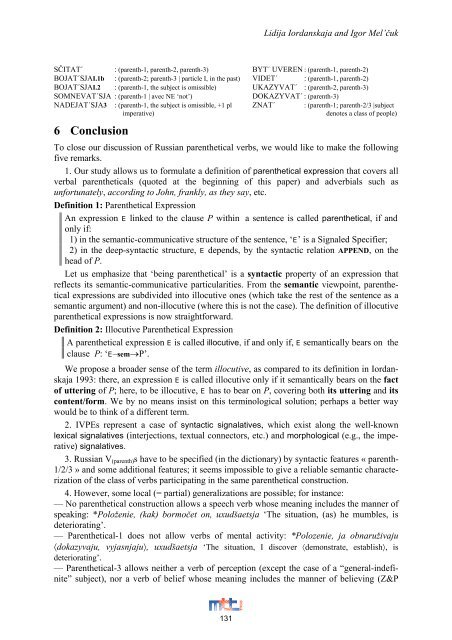Illocutive Parenthetical Verbs in Russian - Observatoire de ...
Illocutive Parenthetical Verbs in Russian - Observatoire de ...
Illocutive Parenthetical Verbs in Russian - Observatoire de ...
Create successful ePaper yourself
Turn your PDF publications into a flip-book with our unique Google optimized e-Paper software.
Lidija Iordanskaja and Igor Mel’čukSČITAT´ : (parenth-1, parenth-2, parenth-3)BOJAT´SJAI.1b : (parenth-2; parenth-3 | particle I, <strong>in</strong> the past)BOJAT´SJAI.2 : (parenth-1, the subject is omissible)SOMNEVAT´SJA : (parenth-1 | avec NE ‘not’)NADEJAT´SJA3 : (parenth-1, the subject is omissible, +1 plimperative)6 ConclusionBYT´ UVEREN : (parenth-1, parenth-2)VIDET´ : (parenth-1, parenth-2)UKAZYVAT´ : (parenth-2, parenth-3)DOKAZYVAT´ : (parenth-3)ZNAT´ : (parenth-1; parenth-2/3 |subject<strong>de</strong>notes a class of people)To close our discussion of <strong>Russian</strong> parenthetical verbs, we would like to make the follow<strong>in</strong>gfive remarks.1. Our study allows us to formulate a <strong>de</strong>f<strong>in</strong>ition of parenthetical expression that covers allverbal parentheticals (quoted at the beg<strong>in</strong>n<strong>in</strong>g of this paper) and adverbials such asunfortunately, accord<strong>in</strong>g to John, frankly, as they say, etc.Def<strong>in</strong>ition 1: <strong>Parenthetical</strong> ExpressionAn expression E l<strong>in</strong>ked to the clause P with<strong>in</strong> a sentence is called parenthetical, if andonly if:1) <strong>in</strong> the semantic-communicative structure of the sentence, ‘E’ is a Signaled Specifier;2) <strong>in</strong> the <strong>de</strong>ep-syntactic structure, E <strong>de</strong>pends, by the syntactic relation APPEND, on thehead of P.Let us emphasize that ‘be<strong>in</strong>g parenthetical’ is a syntactic property of an expression thatreflects its semantic-communicative particularities. From the semantic viewpo<strong>in</strong>t, parentheticalexpressions are subdivi<strong>de</strong>d <strong>in</strong>to illocutive ones (which take the rest of the sentence as asemantic argument) and non-illocutive (where this is not the case). The <strong>de</strong>f<strong>in</strong>ition of illocutiveparenthetical expressions is now straightforward.Def<strong>in</strong>ition 2: <strong>Illocutive</strong> <strong>Parenthetical</strong> ExpressionA parenthetical expression E is called illocutive, if and only if, E semantically bears on theclause P: ‘E–sem→P’.We propose a broa<strong>de</strong>r sense of the term illocutive, as compared to its <strong>de</strong>f<strong>in</strong>ition <strong>in</strong> Iordanskaja1993: there, an expression E is called illocutive only if it semantically bears on the factof utter<strong>in</strong>g of P; here, to be illocutive, E has to bear on P, cover<strong>in</strong>g both its utter<strong>in</strong>g and itscontent/form. We by no means <strong>in</strong>sist on this term<strong>in</strong>ological solution; perhaps a better waywould be to th<strong>in</strong>k of a different term.2. IVPEs represent a case of syntactic signalatives, which exist along the well-knownlexical signalatives (<strong>in</strong>terjections, textual connectors, etc.) and morphological (e.g., the imperative)signalatives.3. <strong>Russian</strong> V (parenth) s have to be specified (<strong>in</strong> the dictionary) by syntactic features « parenth-1/2/3 » and some additional features; it seems impossible to give a reliable semantic characterizationof the class of verbs participat<strong>in</strong>g <strong>in</strong> the same parenthetical construction.4. However, some local (= partial) generalizations are possible; for <strong>in</strong>stance:— No parenthetical construction allows a speech verb whose mean<strong>in</strong>g <strong>in</strong>clu<strong>de</strong>s the manner ofspeak<strong>in</strong>g: *Položenie, (kak) bormočet on, uxudšaetsja ‘The situation, (as) he mumbles, is<strong>de</strong>teriorat<strong>in</strong>g’.— <strong>Parenthetical</strong>-1 does not allow verbs of mental activity: *Polozenie, ja obnaruživaju〈dokazyvaju, vyjasnjaju〉, uxudšaetsja ‘The situation, I discover 〈<strong>de</strong>monstrate, establish〉, is<strong>de</strong>teriorat<strong>in</strong>g’.— <strong>Parenthetical</strong>-3 allows neither a verb of perception (except the case of a “general-<strong>in</strong><strong>de</strong>f<strong>in</strong>ite”subject), nor a verb of belief whose mean<strong>in</strong>g <strong>in</strong>clu<strong>de</strong>s the manner of believ<strong>in</strong>g (Z&P131
















